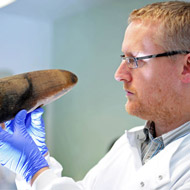
Test also determines species of rhino
A new rapid DNA testing technique is allowing scientists in Vietnam to confirm whether rhino horn is real or fake. The test, which takes just 24 hours, also determines the species of rhino being tested.
According to the Royal Zoological Society of Scotland (RSZZ), 2015 is looking to be one of the worst years on record for rhino poaching, with just under 750 animals already slaughtered in South Africa alone for their horn.
Now a team of wildlife forensic scientists from the United Kingdom and Australia have joined forces to train scientists in Vietnam in rapid rhino horn identification.
The training is particularly vital as poached rhinos are perilously close to outnumbering the birth of rhinos in the wild - a situation which could ultimately lead to their decline and possible loss.
Dr Ross McEwing of the RSZZ explains: “One of the fundamental issues in Vietnam, a country synonymous with the illegal trade in rhino horn, is the requirement to identify true rhino horn from fake material in order to progress any criminal investigation, a process that can take many weeks due to limited capacity and which results in a very low rate of conviction.
“The new rapid DNA testing technique, developed by the Australian Centre Wildlife Genomics, allows this process to be undertaken quickly and inexpensively in under 24 hours. Ensuring Vietnam authorities have the capacity to carry out this new test will help enforcement officers monitor and prosecute those responsible for trading rhino horn.”
Kyle Ewart from the Australian Centre Wildlife Genomics, added: “Three species of rhino are routinely traded in Vietnam – white, black and Indian rhinos – and identifying the species forms part of the investigation, helping enforcement agencies direct resources to target individuals and trade routes".
The training of the technique is an international effort funded by the UK Government, the RSZZ and the Australian Museum.
Image (C) RZSS



 The BSAVA has opened submissions for the BSAVA Clinical Research Abstracts 2026.
The BSAVA has opened submissions for the BSAVA Clinical Research Abstracts 2026.